1. Behaviour > Intelligence

In what other industry does someone with no college degree, no training, no background, and no formal experience outperform someone with the best education and the best training?
I struggle to think of any. But these stories do happen in investing.
Financial success is not a hard science. It's a soft skill, where how you behave is more important than what you know.
Spend 10 minutes on the next 9 behaviours and mindsets, and I am sure you will excel in this soft skill, which can lead to your financial success.
2. Luck & Risk
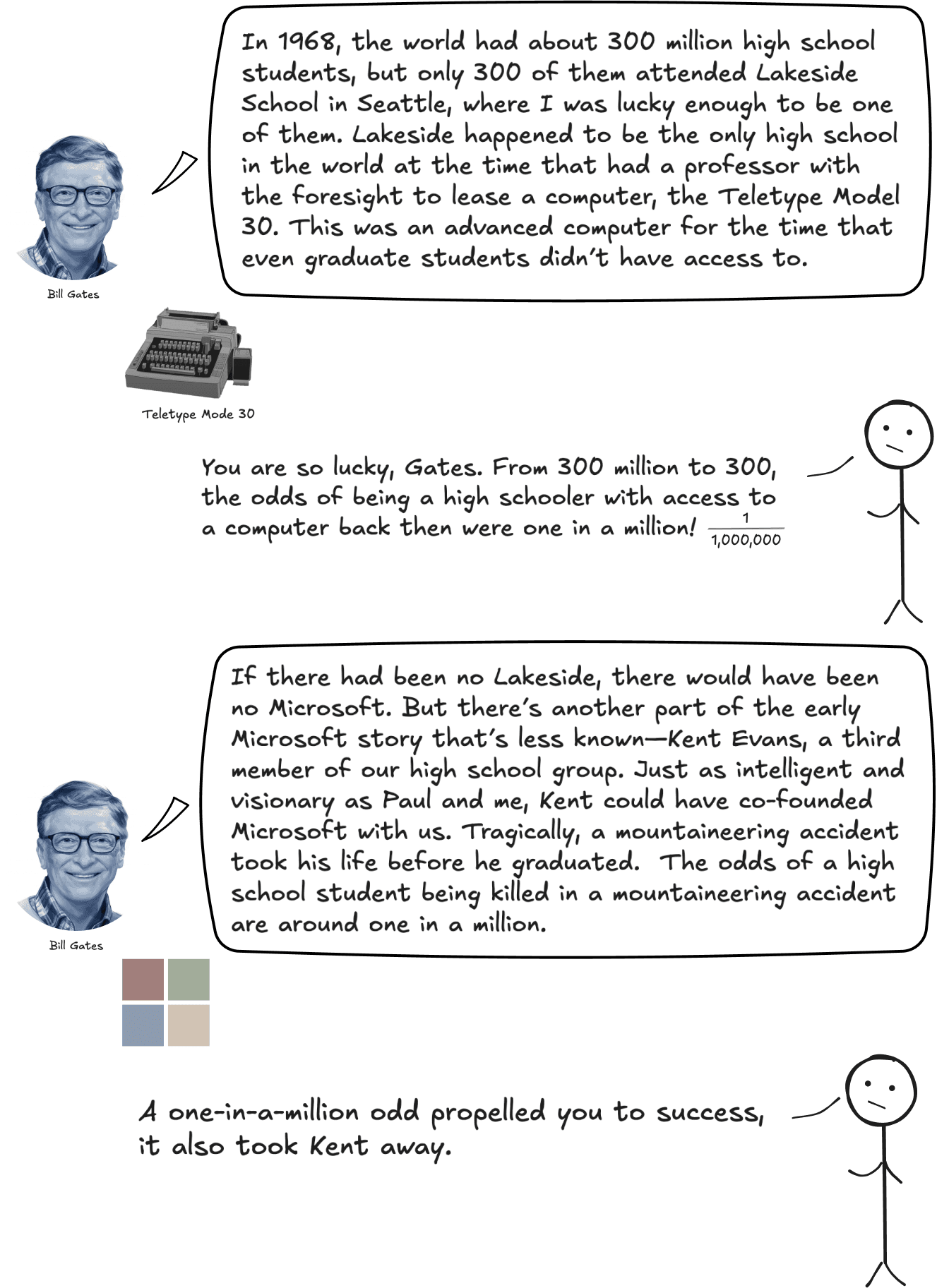
Luck and risk are siblings. Every outcome in life is influenced by factors beyond individual effort. The story of Bill Gates and Microsoft in the picture is a prime example.
In 2006, Mark Zuckerberg turned down Yahoo!'s $1 billion offer for Facebook, a decision praised as visionary as Facebook became one of the world's most valuable companies. Conversely, Yahoo! is often criticized for rejecting Microsoft's $44.6 billion buyout offer in 2008, seen as a missed opportunity given Yahoo!'s later decline.
Remember when judging success—both your own and others': “Nothing is as good or as bad as it seems.” Be cautious in who you praise or criticize, and recognize the roles of luck and risk.
3. Power of Compounding
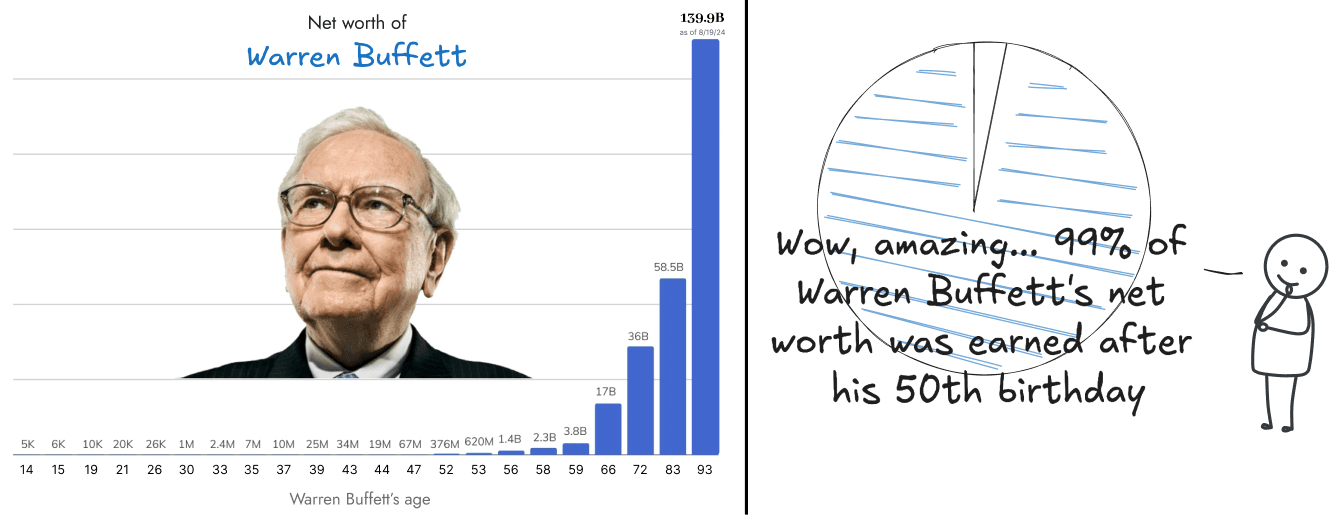
There is no doubt that Warren Buffett is considered one of the greatest investors of all time. But few pay enough attention to the simplest fact: Buffett's fortune isn't just due to his investing skill—it's due to starting early. By beginning at age 10, Buffett harnessed the power of compounding, reaching a net worth of $1 million by 30.
Buffett's skill is investing, but his secret is time. If you want to do better as an investor, the single most powerful thing you can do is to increase your time horizon.
Time is the most powerful force in investing. It makes little things grow big and big mistakes fade away. It pushes results closer towards what people deserve. However, the most powerful outcomes of any compounding process are delayed, so patience is required.
4. No one is crazy

Our willingness to take risks depends on personal history, which shapes how we view investments. We often judge others by their choices—whether they invest in gold, stocks, or cryptos.
But no one is crazy. We all make decisions based on our own unique experiences and information we have at the moment that seem to make sense to us in a given moment. We see the world through a different lens.
As shown in the image, those born in 1970 saw the S&P 500 nearly 10x in their teens and 20s, while those born in 1950 saw almost no growth. Two groups of people, separated by chance of their birth year, end up with completely different views on how the stock market works.
When managing our money in a story-driven world, remember: The more we want something to be true, the more likely we are to believe a story that overestimates the odds of it being true.
Do you remember the hype around cryptos, meme coins, and NFTs?
5. Wealth is what you don't see

We are social beings so it is no surprise that we need social validation.
We tend to judge wealth by what we see—cars, homes and jewellery because that's what we can see. We can't see people's bank accounts or brokerage statements. So we rely on outward appearances to gauge financial success. It's easy to assume that someone driving a Lamborghini is wealthy, but appearances can be deceiving.
The world is filled with people who look modest but are actually wealthy and people who appear wealthy are actually burdened by debt. Spending money to show people how much money you have is the fastest way to have less money.
Wealth is what you don't see. The true key to wealth is self-control, restraint, building assets and investing in your future.
6. Getting wealthy is very different to staying wealthy

Getting wealthy requires taking risks, being optimistic, and putting yourself out there. You can accumulate wealth over time through trial and error, but it's crucial to keep mistakes small.
Staying wealthy, on the other hand, requires the opposite of taking risks. It requires humility, admitting how little you know. It requires fear that what you've made can be taken away fast.
Manage your money in a way that helps you sleep at night is the best universal guidepost for all financial decisions.
When you have little money, invest in education first, as the only real asset you have is your mind. Avoid excessive debt and keep your expenses low.
You might think you want an expensive car or a huge house but I'm telling you you don't. What you want is respect and admiration from other people and you think that having expensive stuff will bring it. But it never works because respect and admiration can't be bought.
7. Save money

The often-overlooked truth is that building wealth has little to do with your income or investment returns, and lots to do with your savings rate.
That's because savings rate is the only variable you can control. You can't control how much money you make or how the stock market, real estate, or cryptos will perform, but you can control how much you save.
As author Morgan puts it, savings are essentially income minus ego.
The less you spend to show off how much you have, the less you desire luxury brands to impress others for respect and admiration, the more you can save.
If you can have a very high savings rate:
It gives you the freedom to pursue what truly matters to you—whether that's taking a job you love, pursuing a passion, or creating something meaningful.
It also makes you more resilient to life's uncertainties. The challenge for us today is that no amount of studying or open-mindedness can genuinely recreate the power of fear and uncertainty. We can read about what it was like to lose everything during the Great Depression, but we don't have the same emotional scars as those who actually experienced it.
8. Use money to buy freedom
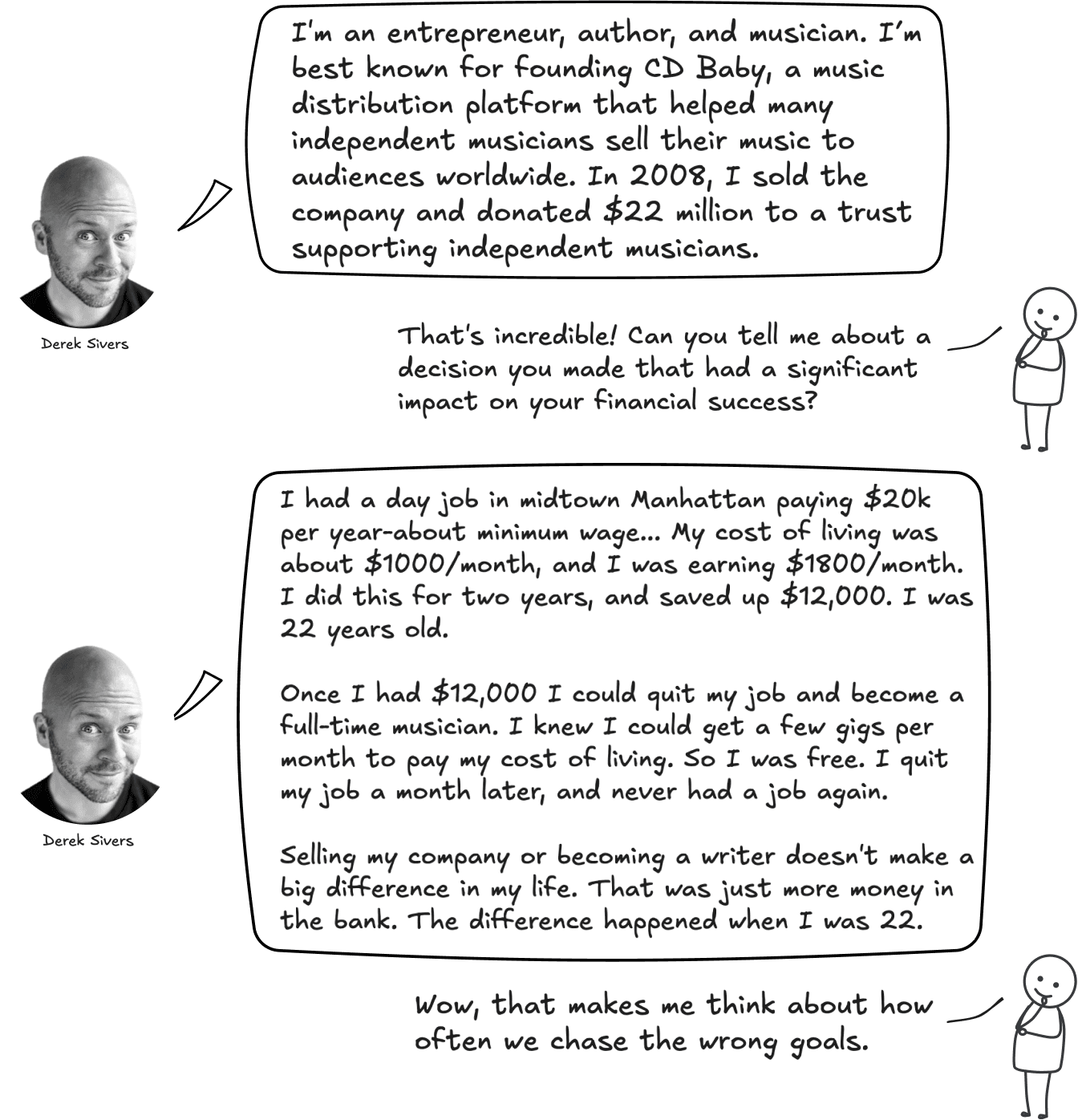
This resonates the most with me. When people ask why I don't spend money on this or that, it's because my focus is to use money to create the life I want.
People want to become wealthier, believing it will lead to greater happiness. However, studies show that a common denominator in happiness is a strong sense of control over our lives, which matters more than a high salary, a large house, or career prestige.
The key to happiness, and the highest form of wealth, is the ability to do what you want, when you want, with who you want, for as long as you want.
This is where money's greatest intrinsic value lies—in the control it gives us over our time.
The pursuit of material wealth has led to many people working harder and sacrificing more control over their time. However, pursuing money without valuing time is like filling a leaky bucket.
Our true wealth is our non-renewable time and freedom.
Government-issued currency quietly steals these two most valuable assets from us. Since the Federal Reserve was founded in 1913, the US dollar lost over 97% of its purchasing power.
9. Everything has a price
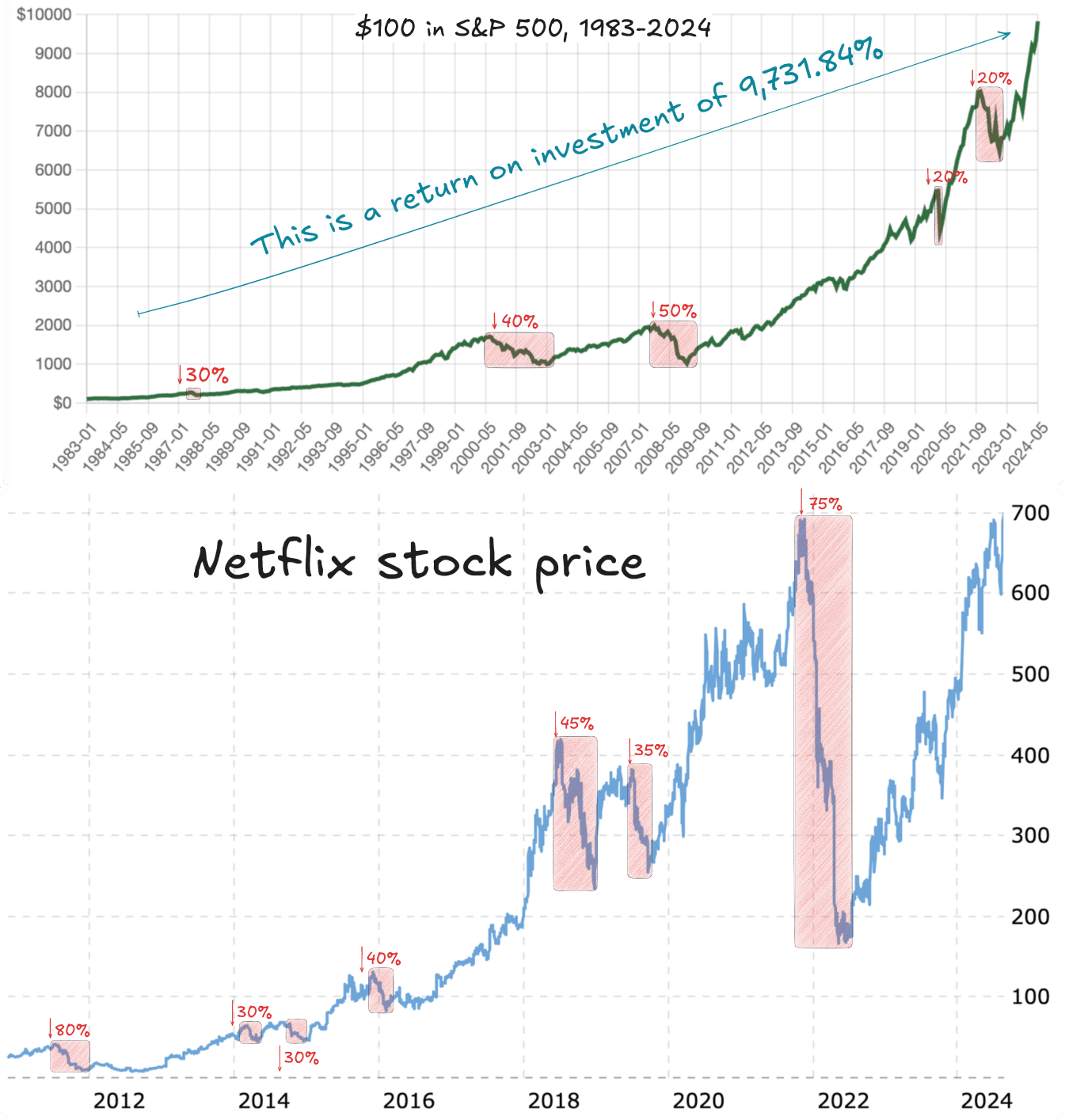
Everything has a price, but not all prices appear on labels.
In investing, the cost isn't just in dollars. It's in accepting the emotions that come with volatility, fear, and risk.
The S&P 500 graph shows that $100 invested in 1983 grew by 9,731.84% by 2024. But this impressive gain came with steep downturns along the way—30%, 40%, and even 50% losses during market crashes.
In investing, the cost isn't just in dollars. It's in accepting the emotions that come with volatility, fear, and risk.
Imagine you foresaw Netflix's potential 13 years ago and invested heavily. Well, you would be quite a rich person today! But could you afford paying the price for this journey? Netflix's stock faced massive drops—30%, 40%, 45%, and even staggering 75% and 80% declines.
Could you have stayed calm through these downturns, when Netflix was losing tons of customers, and your portfolio looked terrible? What would you tell yourself and your loved ones during those tough times?
Do you still remember those recent market declines:
Early 2020: The COVID-19 pandemic triggered a global market selloff
2022: The market experienced a downturn due to soaring inflation and rising interest rates.
August 5, 2024: Global markets took a sharp dive following a surprise rate hike by the Bank of Japan, compounded by fears of a slowing U.S. economy.
Remember, extremely good and bad situations rarely last because supply and demand adjust in unexpected ways.
10. Know when enough is enough
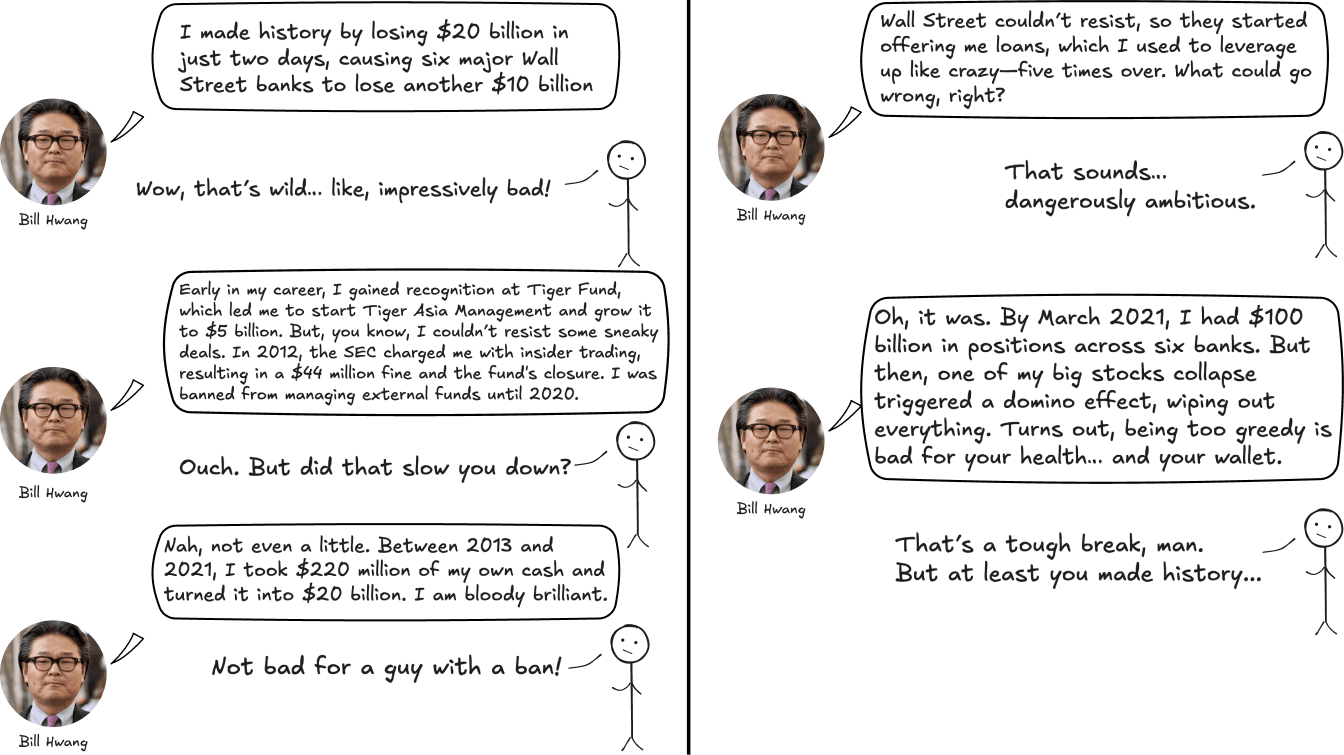
The implosion of the dot-com bubble in the early 2000s reduced household wealth by $6.2 trillion. The housing bubble in 2008 cut away more than $8 trillion, and the 2022 crypto market collapse saw more than $2 trillion vanish.
Why do these things happen? And why do they keep happening?
The common answer here is that people are greedy, and greed is an indelible feature of human nature.
The relentless pursuit of wealth without a sense of knowing when enough is enough is like climbing a never-ending ladder. No matter how high you go, there's always another rung.
There is no reason to risk what you have and need for what you don't have and don't need.